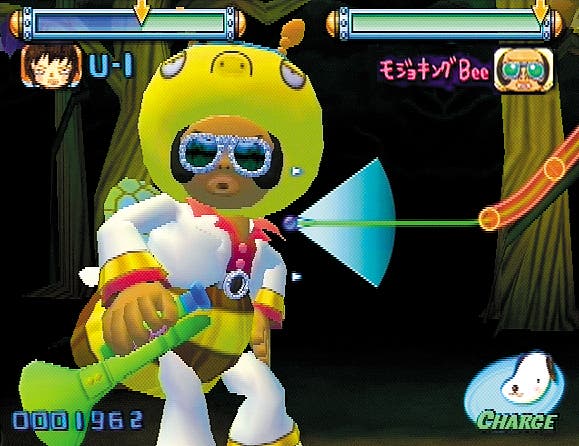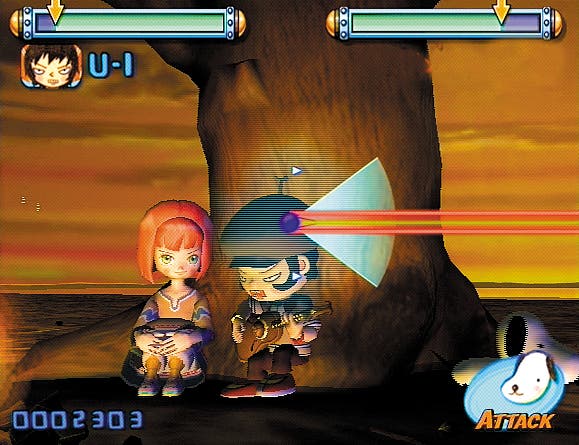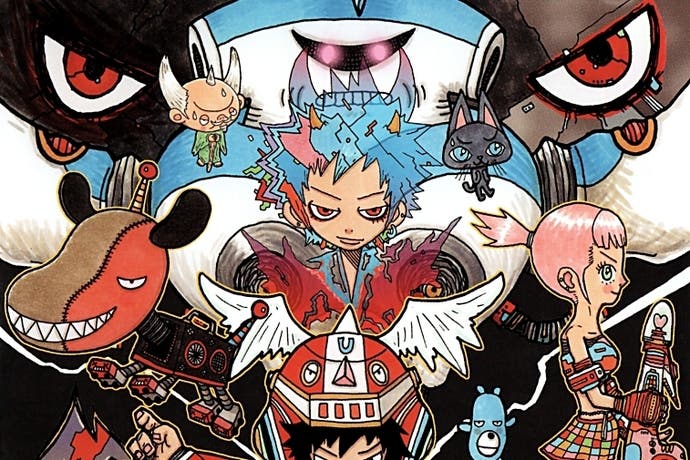Gitaroo Man retrospective
Legendary.
Gitaroo Man is a game that could only have been made by people with a deep, deep love of music. But it's not just a love: it's an innate understanding of tone, of rhythm, of melody, of feel, and how the very best songs combine all that into something wonderful. Little wonder that voice on the title screen breathes the name of its hero with a sigh of pleasure that approaches post-coital bliss. Ahh, Gitaroo Man.
There's pleasure, too, in the telling of its story, a familiar but uplifting tale of an underdog triumphing again the odds. It's about a shy, awkward guy beating the bullies to win the affection of the girl he loves, wrapped in a surreal adventure that sees him use a strange guitar-like instrument to save a race of intergalactic music-lovers from the evil Gravillians.
It wasn't the first time a rhythm-action game had narrative trappings, of course - and its debt to PaRappa The Rapper is obvious - but the music is married to the story with real skill. A fairly straightforward J-Rock battle leads into pulsing, urgent synths denoting an alien invasion, but it's level three where things get really good with a wonderfully funky guitar-trumpet duel with Mojo King Bee.

Then it's onto a blistering drum-and-bass escape from a giant space shark (basically an extended, rhythmic QTE, but it's thrilling with it) followed by a surreal scrap between two giant space mechs, their floaty movements matched by the undulations of the analogue stick as you trace a trail of extended notes, their lines swooping and dipping perfectly as the pitch shifts.
It really feels like you're playing a weird, otherworldly instrument, like a guitar only not quite. Essentially, the left analogue stick is your left hand moving up, down and across the neck to switch between notes, the circle button your right hand, strumming or plucking the strings. It's tricky at first, not least because at times you're playing a solo or an improvised riff rather than a straightforward melody, but it soon begins to click into place. iNiS is fairly exacting with the timing of your button presses, though you'll be grateful of that in the later stages, where you'll need faster fingers to keep up with the more elaborate solos.
Japanese duo COIL deserves much of the credit for the soundtrack, contributing eight tunes, from the catchy opening and ending themes to the swampy reggae of Nuff Respect. Other highlights include the hysterical squall of guitars and church organs in Twisted Dreams to the percussive clanks and clatter of Born to be Bone, a face-off against a skeletal trio that sees xylophone and mariachi guitar duking it out.
But if there's one song everyone who's played and loved Gitaroo Man remembers, it's The Legendary Theme. As U-1 encounters a girl, Kirah, on the beach at dusk, he plays her a tender acoustic piece that's all the more surprising and affecting for the aural assault that's gone before. It's a lovely piece of music: wistful, oddly sad, and paired with a charming and beautifully judged bit of visual storytelling. By firelight we witness the first flush of new love, as the songs swells bring the two closer together, Kirah slowly moving across before gently resting her head on U-1's shoulder, and he blushes with this unexpected show of affection. All in three gorgeous, heart-melting minutes.
It's so potent a shift it's no surprise iNis opted to use a variation on the trick to similarly emotive effect in Osu! Tatakae! Ouendan. Like Hitomi Yaida's Over The Distance, The Legendary Theme is much easier to play than previous levels, the obvious point being that unlike the others - many of which require serious practice to master on your first attempt - you're not meant to fail. Instead, you're invited to simply savour the moment, your playing merely amplifying the emotional resonance of the scene. It works so well precisely because you're not worried about screwing up, and if there's a mild sense of pressure, that's only because you're so desperate to make this moment perfect, even if a bum note or two isn't going to prevent young love from blossoming.

In this moment, iNiS reminds you how a piece of music can instantly transport you. Your favourite songs tend to have an association with a time, a place, a person, a memory. And so The Legendary Theme (Acoustic version) is only actually the first part of the equation. The second comes later, when U-1 is forced into an arena battle with Kirah, unaware that he'd been consorting with the enemy. The two briefly trade blows with extended solos, before U-1 collapses, unwilling to fight. He picks himself up, before launching into a soaring electric version of the melody you'd picked out three chapters earlier, and Kirah is suddenly defenceless, taken back to the quiet, unforgettable moment they shared. Then she picks up her gitaroo once more and joins in as the pair play out a triumphant duet to the cheers and applause of the watching crowd.
It's an absolutely spellbinding, spine-tingling moment, not just because it's so uplifting but also because it imbues the original with greater meaning. Play it again with the knowledge of what's to come, and it's almost enough to make you tear up in anticipation. And when the cheering subsides and U-1 lifts his instrument to the skies, the voice that normally announces his victory instead says "you are the true Gitaroo Man", the perfect coda to the perfect performance.
All of which makes it doubly heartbreaking that iNiS is now reduced to making free-to-play Plants vs Zombies knock-offs: from Gitaroo Man and Ouendan to Lips and Eden vs Green, how the once mighty have fallen. Still, whatever iNiS does next, it will always have been responsible for perhaps rhythm-action's crowning moment, for having given us the perfect marriage of mechanics and melody. We'll forever have the pleasure of using two thumbs and a beautiful song to unite the galaxy in music and in love.
It's enough, in fact, to provoke a sigh of sheer nostalgic joy. Ahh, Gitaroo Man.

